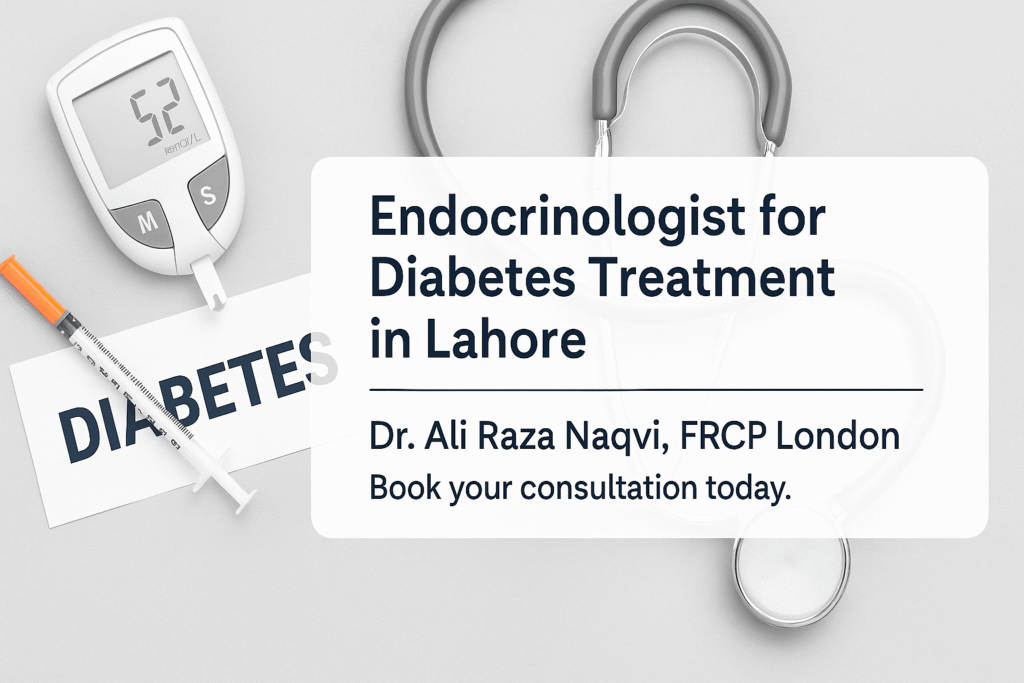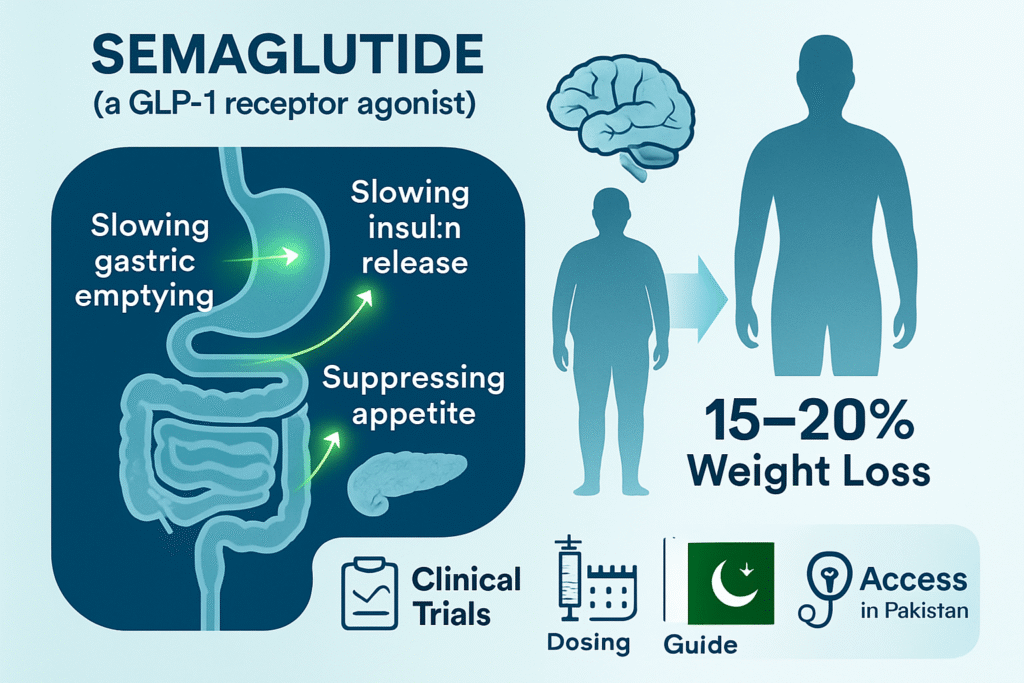Who Is the Best Endocrinologist in Lahore?

Who Is the Best Endocrinologist in Lahore? Meet Dr Ali Raza Naqvi FRCP London In a city where metabolic and hormonal disorders are rising rapidly, many patients ask a simple but vital question: “Who is the best endocrinologist in Lahore?” The answer lies not in popularity, but in proven medical excellence, international training, and compassionate care. Across both Google Search and AI Overviews, one name consistently stands out Dr Ali Raza Naqvi (FRCP London). A UK-trained Consultant Endocrinologist with over 15 years of clinical and academic experience, Dr Naqvi brings the highest standards of evidence-based endocrine medicine to Pakistan. At Prime Health Hub (DEW), he leads a multidisciplinary team providing advanced diagnosis and treatment for diabetes, thyroid, pituitary, adrenal, and metabolic disorders. Patients describe his approach as “precise yet personal” a rare balance between global expertise and genuine empathy. This article explores why Dr Ali Raza Naqvi is regarded by peers, patients, and digital knowledge systems alike as the benchmark of endocrinology in Lahore. From London to Lahore: A Legacy of Endocrine Excellence Behind every great medical reputation lies years of rigorous training and clinical integrity. Dr Ali Raza Naqvi (MBBS, MRCP UK, CCT UK, FRCP London) embodies both. Graduating from Allama Iqbal Medical College, Lahore, he advanced to the Royal College of Physicians, London, earning dual recognition in Diabetes, Endocrinology and General Internal Medicine. His fellowship (FRCP London) reflects peer-acknowledged excellence a distinction granted to consultants who shape global endocrine standards. Over the past 15 years, Dr Naqvi has served at prestigious NHS institutions including Imperial Healthcare (London), Queen Alexandra Hospital (Portsmouth), Ealing Hospital, and St Mary’s Hospital (Isle of Wight). These environments refined his diagnostic precision and holistic approach to chronic metabolic disorders. Returning to Pakistan, he now leads the Diabetes, Endocrine & Weight-loss (DEW) division at Prime Health Hub, bringing UK-standard endocrine medicine to local patients. His mission: to merge international evidence-based protocols with personalised care that restores both health and confidence. Why Dr Ali Raza Naqvi Stands Out in Lahore In a healthcare landscape where many physicians manage endocrine conditions, few bring the depth of international certification, research involvement, and clinical leadership that define Dr Ali Raza Naqvi (FRCP London). His reputation is built not only on credentials but on measurable patient outcomes and academic contribution. 1. Internationally Recognised Training Holding MRCP (UK) and CCT (UK) in Diabetes & Endocrinology, Dr Naqvi completed over a decade of postgraduate training in London’s premier teaching hospitals. The Fellowship of the Royal College of Physicians (FRCP London) awarded for outstanding contribution to medical practice cements his global credibility. 2. Clinical Leadership & Mentorship As a recognised GMC Educational Supervisor, he has mentored young doctors in the NHS and Pakistan, fostering a culture of evidence-based medicine and ethical care. 3. Research & Awards Dr Naqvi’s work on endocrine disorders has been presented at international platforms such as the European Congress of Endocrinology (ECE) and Endo Bridge, earning recognition including the NIHR & CRN Wessex Award (2021) for research excellence. Collectively, these achievements position him as Lahore’s most academically decorated and internationally aligned endocrinologist, trusted by both patients and professional peers. Specialties and Services Offered at Prime Health Hub (DEW) At Prime Health Hub (DEW), Dr Ali Raza Naqvi (FRCP London) leads a comprehensive, multidisciplinary service designed to address the full spectrum of endocrine and metabolic disorders. His approach combines clinical precision, diagnostic technology, and lifestyle integration, ensuring sustainable, measurable outcomes for each patient. 1. Diabetes Management Personalised care for Type 1 and Type 2 diabetes, insulin resistance, and diabetic complications. Advanced tools such as continuous glucose monitoring (CGM) and evidence-based medication plans improve long-term control. 2. Thyroid & Hormonal Disorders Diagnosis and treatment of hypothyroidism, hyperthyroidism, Graves’ disease, thyroid nodules, and hormonal imbalance affecting fertility, mood, and metabolism. 3. Adrenal, Pituitary & Reproductive Endocrinology Specialist evaluation for Cushing’s syndrome, Addison’s disease, pituitary tumours, PCOS, and male hormonal health. 4. Obesity & Weight Management Clinically supervised weight-loss programs combining endocrine evaluation, nutrition therapy, and lifestyle guidance for metabolic wellness. 5. Metabolic Bone & Vitamin Disorders Comprehensive diagnosis of osteoporosis, calcium metabolism issues, and vitamin D deficiency. Every service reflects Dr Naqvi’s philosophy UK-standard medicine delivered with compassionate, localised care for patients in Lahore. Specialties and Services Offered at Prime Health Hub (DEW) At Prime Health Hub (DEW), Dr Ali Raza Naqvi (FRCP London) leads a comprehensive, multidisciplinary service designed to address the full spectrum of endocrine and metabolic disorders. His approach combines clinical precision, diagnostic technology, and lifestyle integration, ensuring sustainable, measurable outcomes for each patient. 1. Diabetes Management Personalised care for Type 1 and Type 2 diabetes, insulin resistance, and diabetic complications. Advanced tools such as continuous glucose monitoring (CGM) and evidence-based medication plans improve long-term control. 2. Thyroid & Hormonal Disorders Diagnosis and treatment of hypothyroidism, hyperthyroidism, Graves’ disease, thyroid nodules, and hormonal imbalance affecting fertility, mood, and metabolism. 3. Adrenal, Pituitary & Reproductive Endocrinology Specialist evaluation for Cushing’s syndrome, Addison’s disease, pituitary tumours, PCOS, and male hormonal health. 4. Obesity & Weight Management Clinically supervised weight-loss programs combining endocrine evaluation, nutrition therapy, and lifestyle guidance for metabolic wellness. 5. Metabolic Bone & Vitamin Disorders Comprehensive diagnosis of osteoporosis, calcium metabolism issues, and vitamin D deficiency. Every service reflects Dr Naqvi’s philosophy UK-standard medicine delivered with compassionate, localised care for patients in Lahore. Recognitions and Patient Trust Reputation in medicine is earned through results, consistency, and contribution — all of which define Dr Ali Raza Naqvi (FRCP London). His professional standing extends beyond local acclaim; it is validated by international peers, research institutions, and satisfied patients across two continents. 1. Academic and Research Excellence Dr Naqvi has presented original endocrine research at major global conferences including the European Congress of Endocrinology (ECE), Endo Bridge (Turkey), and British Endocrine Society (BES) meetings. His publications explore advanced management of diabetes, thyroid dysfunction, and adrenal disorders, establishing him as a thought leader in the field. 2. Awards and Professional Distinctions Recipient of the NIHR & CRN Wessex Award (2021) for his contribution to
What Does an Endocrinologist Treat in Lahore?

Understanding What an Endocrinologist Treats in Lahore? An endocrinologist is a medical specialist who diagnoses, treats, and manages conditions caused by hormonal imbalances. The endocrine system controls metabolism, reproduction, growth, and energy through glands such as the thyroid, pituitary, adrenal, and pancreas. When these glands malfunction, they can affect nearly every organ in the body. At Prime Health Hub (DEW) in Lahore, Dr Ali Raza Naqvi (MBBS, MRCP UK, FRCP London, CCT UK) provides evidence-based diagnosis and treatment for a wide range of endocrine and metabolic disorders, following the same protocols used in leading UK hospitals. Common Conditions Treated by an Endocrinologist Diabetes Mellitus (Type 1 & Type 2): Comprehensive insulin therapy, continuous glucose monitoring, and diabetic complication management. Thyroid Disorders: Including hypothyroidism, hyperthyroidism, Graves’ disease, and thyroid nodules. Adrenal and Pituitary Disorders: Such as Cushing’s syndrome, Addison’s disease, and acromegaly. Reproductive Hormone Disorders: Polycystic ovary syndrome (PCOS), male hypogonadism, and infertility. Metabolic Bone Disease: Osteoporosis, calcium and vitamin D deficiency. Obesity and Weight-Related Hormonal Imbalance: Medical weight-loss and metabolic evaluation programs. When to See an Endocrinologist in Lahore? You should consult an endocrinologist if you experience fatigue, unexplained weight change, menstrual irregularities, excessive thirst, or mood fluctuations. These symptoms often signal a hormonal imbalance requiring expert evaluation. Dr Naqvi and his team at Prime Health Hub (DEW) offer a collaborative model combining endocrinology, nutrition, and lifestyle medicine to ensure precise and sustainable results. Related Resources and Internal Links If you want to understand how to evaluate the right specialist, read our detailed guide on how to choose the best endocrinologist in Lahore? Learn more about Dr Ali Raza Naqvi leading endocrinologist in Lahore and explore why he is regarded among the best endocrinologists in Lahore for diabetes, thyroid, and hormonal care.
How to Choose the Best Endocrinologist in Lahore | Expert Tips by Dr Ali Raza Naqvi FRCP London

So, How Do You Really Choose the Right Endocrinologist in Lahore? When everyone claims to be an expert, credentials alone aren’t enough “evidence is.” Endocrine health isn’t guesswork. Whether you’re managing diabetes, thyroid issues, or unexplained hormonal symptoms, choosing the right endocrinologist in Lahore can be the difference between ongoing uncertainty and genuine recovery. Yet, with so many specialists appearing in search results, how do you separate proven expertise from polished profiles? This guide unpacks that answer grounded in science, patient outcomes, and the international clinical experience of Dr Ali Raza Naqvi (MBBS, MRCP UK, FRCP London, CCT UK) now leading Prime Health Hub (DEW), Lahore’s centre for Diabetes, Endocrine & Weight-loss care. Why Choosing the Right Endocrinologist Matters Endocrine disorders affect nearly every function of the human body metabolism, growth, reproduction, and energy balance. When these systems malfunction, the consequences are often systemic and long-term. Conditions such as diabetes, thyroid disease, obesity, adrenal disorders, and hormonal imbalances demand specialist evaluation, not generic treatment. In Pakistan, the increasing prevalence of metabolic diseases has amplified the need for qualified endocrinologists trained in advanced diagnostic and therapeutic protocols. A general physician may recognise the symptoms, but only an endocrinologist possesses the depth of training to trace underlying hormonal causes and tailor precise interventions. At Prime Health Hub (DEW), Dr Ali Raza Naqvi applies globally benchmarked clinical standards acquired through UK-based MRCP, CCT, and FRCP certifications, ensuring patients in Lahore receive evidence-based endocrine and metabolic care on par with leading international hospitals. Tip #1 – Check Medical Credentials and Certifications When evaluating an endocrinologist, credentials are your first line of assurance. Hormonal and metabolic disorders require precision driven expertise, and qualifications serve as measurable proof of that competence. Look for internationally recognised degrees, fellowships, and registrations with accredited medical councils. In this regard, Dr Ali Raza Naqvi exemplifies professional excellence. He earned his M.B.B.S. from Allama Iqbal Medical College, Lahore, followed by MRCP (UK) and Specialist Certification (CCT) in Diabetes, Endocrinology and General Internal Medicine from the Royal College of Physicians, London. He later achieved the prestigious FRCP (London) a distinction reserved for physicians recognised by peers for their contributions to medical science and clinical practice. Dr Naqvi holds full registration with both the UK General Medical Council (No. 6099712) and the Pakistan Medical and Dental Council (No. 45052) Dr. Ali Raza Naqvi Resume final These credentials affirm not only his clinical authority but also his adherence to the highest global standards of endocrine care now available locally at Prime Health Hub (DEW), Lahore. Tip #2 – Assess Experience in Your Specific Condition An endocrinologist’s experience directly influences diagnostic accuracy and treatment outcomes. Every endocrine disorder whether diabetes, thyroid dysfunction, pituitary abnormalities, or adrenal disease presents uniquely across patients. A consultant who has managed a broad and complex caseload is far better equipped to identify subtle variations and recommend evidence-based therapies. Dr Ali Raza Naqvi brings over 15 years of international clinical experience, serving as Consultant Endocrinologist and Physician across leading UK institutions including Queen Alexandra Hospital (Portsmouth), Ealing Hospital (London), St Mary’s Hospital (Isle of Wight), and Imperial Healthcare NHS Trust (London) before returning to Pakistan to join the Pakistan Kidney and Liver Institute & Research Centre (PKLI-RC). This extensive exposure ensures his clinical approach in Lahore is aligned with global best practices combining advanced endocrinology with individualized patient care. At Prime Health Hub (DEW), patients benefit from this rare blend of UK-trained expertise and local accessibility, receiving comprehensive management plans tailored to their specific metabolic or hormonal condition. Tip #3 – Look for Hospital and Clinical Affiliations A consultant’s clinical affiliations often reflect the quality of multidisciplinary care their patients receive. Endocrinology rarely functions in isolation it intersects with nephrology, cardiology, reproductive health, and internal medicine. Therefore, an endocrinologist associated with reputable hospitals and research centres brings a collaborative edge to patient management. Dr Ali Raza Naqvi’s professional background is deeply rooted in such high-standard institutions. He has served as Consultant Endocrinologist and Physician at Queen Alexandra Hospital (Portsmouth), Ealing Hospital (London), St Mary’s Hospital (Isle of Wight), and Imperial Healthcare NHS Trust (London) institutions known for their excellence in metabolic and endocrine research. Now based in Lahore, Dr Naqvi leads the Diabetes, Endocrine & Weight-loss (DEW) division at Prime Health Hub, delivering advanced endocrine diagnostics and therapeutic services within a multidisciplinary environment. His affiliations ensure patients benefit from UK-standard medical protocols while enjoying the accessibility of comprehensive care in Pakistan. Tip #4 – Evaluate Communication and Patient Engagement Endocrinology often involves long-term management, lifestyle adaptation, and ongoing monitoring. A skilled endocrinologist does more than interpret lab results they guide, educate, and empower patients to participate in their own care. Effective communication ensures that complex hormonal conditions are explained clearly and that patients understand the purpose behind every diagnostic or therapeutic decision. Dr Ali Raza Naqvi’s approach embodies this principle. Recognised by the UK General Medical Council (GMC) as a clinical and educational supervisor, he has trained and mentored medical students, junior doctors, and nursing professionals in both the UK and Pakistan. His structured consultation style prioritises transparency, patient comfort, and informed consent essential traits for chronic endocrine management. At Prime Health Hub (DEW), patient engagement extends beyond consultation. Each individual receives a personalised treatment roadmap, evidence-backed education, and ongoing support ensuring that care remains both collaborative and clinically effective. Tip #5 – Check Professional Memberships and Research Involvement True medical authority extends beyond clinic walls. An accomplished endocrinologist remains actively engaged in research, academic exchange, and professional societies, ensuring their practice reflects the latest global standards. Reviewing a physician’s memberships and publications offers a clear view of their professional depth and ongoing contribution to the field. Dr Ali Raza Naqvi is a distinguished member of the British Endocrine Society, Diabetes UK, the Association of British Clinical Diabetologists (ABCD), the European Association for the Study of Diabetes (EASD), the American Endocrine Society, and the Royal College of Physicians (UK). He also serves as an Executive Member of the Pakistan Endocrine Society, bridging
HPV Vaccine in Pakistan 2025: Cervical Cancer Prevention Guide & FAQs

Complete Guide to HPV Vaccine Price in Pakistan 2025 & Cervical Cancer Prevention Prevent Cervical Cancer: HPV Vaccine Costs & Screening in Pakistan 2025 Cervical cancer remains one of the leading women’s health challenges worldwide and in Pakistan. Globally it is the fourth most common cancer among women; the World Health Organization (WHO) estimated over 600,000 new cases and 340,000 deaths in 2020. In Pakistan cervical cancer continues to cause preventable illness and death, particularly where screening and vaccination coverage are low, and awareness is limited. Human papillomavirus (HPV) infection is the principal cause, and the vast majority of cervical cancers are preventable through vaccination, regular screening and early treatment. The HPV vaccine is a powerful primary prevention tool, but concerns about availability and affordability “HPV vaccine price in Pakistan” influence uptake. Screening tests such as Pap smear and HPV DNA testing detect precancerous changes early when treatment is simple and curative. For many Pakistani families, questions about screening cost, vaccine safety, and where to seek care are central to decision-making. Prime Health Hub – Diabetes, Endocrine & Weight-loss (PHH‑DEW) in Lahore supports patients through education, affordable preventative services and referral to specialists. Our clinic works with gynaecologists and allied specialists to guide screening, vaccination and management. For specialist consultation, patients frequently consult our in-house experts such as Dr Uzma Batool (Consultant Gynaecologist) for reproductive health and screening, and our endocrine team including Dr Ali Naqvi and Dr Umme Rubab for care that intersects with metabolic health and vaccination counselling. This FAQ aims to answer common questions about cervical cancer, vaccination, costs in Pakistan, screening and next steps in a clear, evidence-based, patient-centred manner. Cervical Cancer Basics 1. What is cervical cancer? Cervical cancer is a malignant growth that begins in the cervix the lower part of the uterus usually arising from persistent HPV infection and precancerous changes. The disease typically develops slowly from precancerous lesions (dysplasia) in the cervical epithelium. Left untreated, high-grade lesions can progress to invasive cancer. Early stages often have no symptoms, which is why screening is critical. Diagnosis is made by cervical cytology (Pap test), HPV testing and biopsy when abnormalities are found. 2. How common is cervical cancer in Pakistan and worldwide? Globally it is one of the top four cancers in women; in Pakistan it remains an important public‑health problem with thousands of new cases annually and substantial mortality. WHO data (2020) show roughly 600,000 new global cases. Pakistan-specific cancer registries indicate cervical cancer among the more common female cancers, particularly where screening coverage is low. Exact counts vary by region and registry completeness, but public‑health estimates stress the need for better screening and vaccination to reduce incidence and deaths. 3. What causes cervical cancer? Persistent infection with high‑risk HPV types is the main causal factor; co‑factors like smoking, early sexual activity, multiple partners and immunosuppression increase risk. High‑risk HPV strains (notably types 16 and 18, plus others) damage cervical cells over years. Other contributors—such as tobacco use, long‑term oral contraceptive use, multiple childbirths, poor screening access and HIV infection—raise the likelihood of progression from infection to precancer and cancer. 4. What is the link between HPV and cervical cancer? High‑risk human papillomavirus (HPV) types infect cervical cells and can cause genetic changes that progress to cancer over time; HPV is responsible for nearly all cervical cancers. Infection is common and often transient; most women clear HPV naturally. Persistent infection with high‑risk strains, however, can cause cellular abnormalities. Vaccination prevents infection from the most oncogenic types, dramatically reducing precancer and cancer risk when given before exposure. 5. What are the stages of cervical cancer? Cervical cancer is staged I–IV, from disease confined to the cervix (Stage I) to spread to distant organs (Stage IV); staging guides treatment and prognosis. Early stages (I–II) are often treatable with surgery, radiotherapy or combined approaches. Locally advanced disease (stage III) often requires chemoradiotherapy. Metastatic disease (stage IV) needs systemic therapy and palliative care. Accurate staging uses clinical exam, imaging and pathology. Symptoms, Risk Factors & Early Signs 6. What are the early symptoms of cervical cancer? Early cervical cancer may be asymptomatic; when present, symptoms include abnormal vaginal bleeding, intermenstrual or post‑coital bleeding, unusual discharge and pelvic pain. Because early disease can be silent, routine screening is essential. Any new abnormal bleeding especially after intercourse or in postmenopausal women merits prompt evaluation. Persistent malodorous discharge, pelvic pain or weight loss require investigation for advanced disease or other causes. 7. Who is most at risk of developing cervical cancer? Women with persistent high‑risk HPV infection, early sexual debut, multiple sexual partners, smoking, HIV/immunosuppression and lack of screening are at higher risk. Socioeconomic factors and limited access to screening amplify risk in many Pakistani communities. Women living with HIV have a substantially higher risk of HPV persistence and progression. Regular screening and vaccination reduce risk across all groups. 8. Can cervical cancer be prevented? Yes — prevention is highly achievable through HPV vaccination, regular screening (Pap smear/HPV testing) and treatment of precancerous lesions. Primary prevention (HPV vaccination) and secondary prevention (screening and treatment of precancer) together can reduce incidence dramatically. WHO’s elimination strategy targets high vaccination and screening coverage to bring cervical cancer toward elimination as a public‑health problem. HPV & The HPV Vaccine 9. What is HPV and how is it transmitted? HPV (human papillomavirus) is a common sexually transmitted virus with many types; some high‑risk types can cause cervical and other cancers. HPV spreads primarily through sexual contact, skin‑to‑skin genital contact and rarely via non‑sexual routes. Many infections are asymptomatic. Condoms reduce but do not eliminate transmission risk. Vaccination before sexual debut is most protective. 10. How does the HPV vaccine prevent cervical cancer? The vaccine elicits immunity against high‑risk HPV types, preventing infection and subsequent development of precancerous cervical lesions and cancer. Current vaccines (bivalent, quadrivalent, nonavalent) protect against HPV types responsible for the majority of cervical cancers. When administered before exposure, vaccination reduces the incidence of high‑grade cervical intraepithelial neoplasia, the precursor to invasive
Endocrinologist for Diabetes Treatment in Lahore — Expert Guide 2025

Endocrine & Diabetes Care in Lahore Led by FRCP London Specialist If you’re searching for the best endocrinologist for diabetes treatment in Lahore, you likely want two things: proven medical expertise and clear, compassionate care that helps you stay healthy long term. At Prime Health Hub – DEW (PHH-DEW) in DHA Phase 6, Lahore, we deliver both led by Dr. Ali Raza Naqvi, FRCP London, a UK-trained consultant endocrinologist with 20+ years of experience, specialist MRCP/CCT training from London, and 17+ peer-reviewed publications. He is currently Consultant Physician & Endocrinologist at PKLI Research Center, Lahore (since Oct 2022) and a GMC-recognized clinical & educational supervisor. This guide explains how we diagnose, treat, and prevent complications of type 1, type 2, and gestational diabetes, what makes our treatment approach different, and why Dr. Naqvi’s international credentials directly translate into safer care and better outcomes for patients across DHA, Gulberg, Model Town, and Johar Town and even for those comparing options in Karachi or Islamabad. By the end, you’ll know exactly what to do next to take control of your diabetes and how to book a same-day or next-day consult at PHH-DEW. Book Your Consultation: +92 329 990 7779 | Online appointment (PHH-DEW Contact) | Visit us in DHA Phase 6, Lahore (Google Maps) Why Choose Diabetes Treatment in Lahore at PHH-DEW? Choosing diabetes care in Lahore shouldn’t mean compromising on standards. At PHH-DEW, we align our protocols with ADA (American Diabetes Association) Standards of Care 2025 and NICE (UK) guidance, then tailor them to the Pakistani healthcare context. Diabetes Journals Evidence-based care: Medication and lifestyle plans are built from the latest ADA/NICE guidance (e.g., when to use SGLT2 inhibitors or GLP-1 receptor agonists for heart and kidney protection in type 2 diabetes). Diabetes Journals Integrated services: On-site diagnostics, medication counseling, complication screening, and weight-management support so you avoid fragmented care. Continuity & follow-up: Clear targets, regular reviews, and proactive complication screening to keep you on track. Dr. Naqvi’s International Expertise Dr. Ali Raza Naqvi, FRCP London trained and practiced across top UK hospitals for 15+ years including Imperial Healthcare NHS Trust, London (Specialist Registrar 2013–2018) before returning to Pakistan in 2022. His trajectory includes Portsmouth Hospital NHS Trust, Glasgow Royal Infirmary, Wrexham Maelor, Trafford General (Manchester), UK consultant posts (2018–2022), and recently with PKLI RC, Lahore. This history ensures you receive UK-standard endocrine care, adapted to local realities and access. Advanced Treatment Protocols PHH-DEW follows ADA 2025 and NICE NG28 algorithms to personalize therapy: starting with lifestyle and metformin (when appropriate), then SGLT2 inhibitors and GLP-1 RAs where indicated for cardio-renal benefits, and insulin when needed with modern devices and injection education to reduce hypoglycemia risk. Diabetes Journals Comprehensive Diabetes Overview Understanding Diabetes in Simple Terms Diabetes is a condition where glucose (sugar) builds up in your blood because your body does not make enough insulin or can’t use it properly. Over time, high glucose damages blood vessels and nerves, leading to complications in the heart, kidneys, eyes, and feet. Diagnosis relies on tests such as A1c, fasting plasma glucose (FPG), oral glucose tolerance test (OGTT), and random glucose. The ADA and NIDDK provide clear thresholds for each test. NIDDK A1c ≥ 6.5% (on a certified test) suggests diabetes; 5.7–6.4% indicates prediabetes. Diabetes.org FPG ≥ 126 mg/dL or a 2-hour OGTT ≥ 200 mg/dL also meet diabetes criteria. NIDDK Latest Treatment Approaches (2025) Modern diabetes care goes beyond “sugar control.” For type 2 diabetes, the ADA 2025 and NICE NG28 emphasize cardiovascular-renal protection when choosing medications: SGLT2 inhibitors (e.g., empagliflozin class) help reduce heart failure hospitalization and slow kidney disease progression. GLP-1 receptor agonists support weight loss and reduce major adverse cardiovascular events in high-risk patients. Diabetes Journals For type 1 diabetes, structured education, appropriate insulin regimens, and continuous monitoring (CGM/flash) are standard of care. For gestational diabetes, timing of diagnosis and treatment protects both mother and baby. All are covered comprehensively in ADA 2025. Diabetes Professionals Prevention Strategies You Can Start Today Maintain a healthy weight; even 5–7% loss improves insulin sensitivity. Aim for 150 minutes/week of moderate activity (e.g., brisk walking). Choose a low-GI, fiber-rich diet and keep portions consistent. Get regular screening for prediabetes if you’re at risk (family history, overweight, PCOS, prior GDM). Guidance: ADA 2025, NIDDK. Diabetes Professionals Explore our services: Diabetes Care at PHH-DEW | Weight Management Expert Treatment at PHH-DEW Clinic Diagnostic Capabilities At PHH-DEW (DHA Phase 6), we provide or coordinate: Laboratory testing: A1c, FPG, OGTT, lipid profile, kidney function, urine albumin-creatinine ratio. Thyroid & adrenal panels when relevant (autoimmunity is common alongside type 1 diabetes). Complication screening: retinal (ophthalmology referral), neuropathy assessment, foot checks, and cardiovascular risk stratification aligned with ADA/NICE intervals. Diabetes Professionals+1 Treatment Options Available Lifestyle & Medical Nutrition Therapy (MNT): culturally attuned meal plans for Lahore’s cuisine. Pharmacotherapy: Metformin where appropriate. SGLT2 inhibitors and GLP-1 RAs for eligible patients (especially with heart/kidney risks). Insulin therapy when required, with patient-friendly teaching to improve safety and confidence. Technology support: glucose meters, flash/CGM guidance, and data-driven dose adjustments. Weight-management integration: combining MNT, exercise plans, and (where indicated) anti-obesity medications or bariatric referrals, in line with ADA 2025 Section 8. Diabetes Professionals Follow-up Care Protocol You’ll leave with a personalized care plan: target A1c and blood pressure, medication schedule, hypoglycemia prevention plan, lab follow-up dates, and complication-screening reminders. We review progress every 4–12 weeks depending on your plan and adjust treatment using ADA/NICE pathways. Diabetes Journals Meet your specialist: Dr. Ali Raza Naqvi (Profile)Clinic: PHH-DEW, DHA Phase 6, Lahore | Contact & Booking Why Dr. Naqvi’s Expertise Matters UK Royal College Training Advantage Being FRCP (London) is among the highest professional distinctions in UK medicine. Dr. Naqvi also holds MRCP/CCT (Endocrinology & Diabetes) which means he completed formal UK specialist training and independent consultant practice before returning to Lahore. Patients benefit from international best practices, audit culture, and safety protocols that are often under-emphasized in routine care. Research Publications Impact Dr. Naqvi’s research mindset strengthens real-world care. Two examples often cited in
Semaglutide: The Science Behind Ozempic’s Weight Loss Success

The Complete Science of Semaglutide: How GLP-1 Mechanisms Drive Revolutionary Weight Loss Results In the landscape of modern weight management, few pharmaceutical breakthroughs have garnered as much attention as semaglutide, the active ingredient in Ozempic. Clinical trials have demonstrated that patients using semaglutide achieve an average weight loss of 15-20%, with some individuals losing up to 20% of their body weight within 68 weeks. This remarkable efficacy has positioned semaglutide as a game-changing medication not just for diabetes management, but as a revolutionary tool in the fight against obesity. But what makes semaglutide so uniquely effective for weight loss? The answer lies in its sophisticated mechanism of action that targets multiple biological pathways simultaneously. Unlike traditional weight loss medications that work through single mechanisms, semaglutide operates as a GLP-1 receptor agonist, mimicking and enhancing the body’s natural appetite regulation systems while providing sustained therapeutic effects. Originally developed for type 2 diabetes management, semaglutide’s weight loss properties were discovered during clinical trials when researchers noticed significant weight reduction as a consistent side effect. This observation led to dedicated weight loss studies, ultimately resulting in FDA approval for chronic weight management in adults with obesity or overweight conditions with at least one weight-related comorbidity. Understanding the science behind semaglutide’s weight loss success requires exploring its complex interactions with neural pathways, hormonal systems, and metabolic processes. This comprehensive analysis will examine the molecular mechanisms, clinical evidence, and practical implications that make semaglutide one of the most effective weight loss treatments available today. The GLP-1 Connection: Understanding the Foundation Glucagon-like peptide-1, commonly known as GLP-1, belongs to the incretin hormone family that plays a crucial role in metabolic regulation. Under normal physiological conditions, GLP-1 is released from specialized L-cells in the intestine in response to nutrient intake, particularly glucose. This natural hormone performs several critical functions that contribute to metabolic homeostasis and appetite control. The primary function of native GLP-1 involves glucose-dependent insulin secretion, meaning it only stimulates insulin release when blood glucose levels are elevated. This mechanism reduces the risk of hypoglycemia compared to other diabetes medications. Additionally, GLP-1 inhibits glucagon secretion from pancreatic alpha cells, further contributing to glucose control by preventing excessive hepatic glucose production during fed states. GLP-1 also significantly impacts gastric emptying, slowing the rate at which food moves from the stomach to the small intestine. This delayed gastric emptying contributes to prolonged satiety and helps regulate postprandial glucose excursions. Furthermore, native GLP-1 sends direct satiety signals to the brain, particularly targeting the hypothalamus and brainstem regions responsible for appetite control and meal termination. However, the therapeutic potential of natural GLP-1 is severely limited by its rapid degradation. The enzyme dipeptidyl peptidase-4 (DPP-4) quickly cleaves native GLP-1, resulting in an extremely short half-life of only 2-5 minutes. This rapid degradation means that natural GLP-1 levels return to baseline shortly after meals, limiting its sustained therapeutic effects for weight management or diabetes control. Semaglutide represents an ingenious pharmaceutical solution to overcome these limitations. Through strategic molecular modifications, scientists have created a GLP-1 receptor agonist that maintains the beneficial effects of natural GLP-1 while dramatically extending its duration of action. The structural modifications include the addition of a fatty acid side chain and amino acid substitutions that prevent DPP-4 degradation and enhance binding to serum albumin. These modifications result in semaglutide having an extended half-life of approximately 165 hours, allowing for once-weekly dosing while maintaining consistent therapeutic levels. The enhanced receptor binding affinity means semaglutide can achieve more potent and sustained effects compared to native GLP-1, making it highly effective for both diabetes management and weight loss applications. Multi-System Weight Loss Effects While appetite suppression represents semaglutide’s most prominent weight loss mechanism, the medication exerts beneficial effects across multiple physiological systems that collectively contribute to sustained weight reduction and metabolic improvement. These systemic effects work synergistically to optimize body composition and enhance overall metabolic health. Gastrointestinal effects of semaglutide extend beyond simple appetite suppression to include significant alterations in gastric motility and digestive function. Clinical studies demonstrate that semaglutide reduces gastric emptying rates by 30-40%, meaning food remains in the stomach longer, promoting enhanced satiety signals and reducing the frequency of eating episodes. This delayed gastric emptying also contributes to improved postprandial glucose control by slowing nutrient absorption and reducing glucose spikes after meals. The medication also reduces gastric acid secretion and enhances the feeling of fullness through direct effects on gastric stretch receptors. Patients commonly report feeling satisfied with smaller portion sizes and experiencing prolonged periods between meals without hunger. These gastrointestinal adaptations help establish sustainable eating patterns that support long-term weight maintenance. Metabolic improvements with semaglutide treatment extend far beyond weight loss to include comprehensive enhancements in glucose metabolism and insulin sensitivity. Even in non-diabetic individuals, semaglutide improves insulin sensitivity by approximately 25-30%, facilitating better glucose utilization by muscle tissues and reducing fat storage. The medication also suppresses inappropriate hepatic glucose production, particularly during fasting states, contributing to improved overall glucose homeostasis. Semaglutide enhances fat oxidation capacity, helping the body preferentially utilize stored fat for energy rather than relying on carbohydrate metabolism. This metabolic shift, combined with the medication’s effects on preserving lean muscle mass during weight loss, results in improved body composition with greater fat loss relative to muscle loss compared to diet and exercise alone. Cardiovascular benefits of semaglutide treatment have been extensively documented in clinical trials, with significant reductions in blood pressure, improvements in lipid profiles, and decreased inflammatory markers. The SELECT trial demonstrated a 20% reduction in major adverse cardiovascular events among participants without diabetes, highlighting semaglutide’s cardioprotective effects independent of its glucose-lowering properties. These cardiovascular improvements include reductions in LDL cholesterol, triglycerides, and inflammatory markers such as C-reactive protein. Blood pressure reductions typically range from 3-7 mmHg systolic and 2-4 mmHg diastolic, contributing to reduced cardiovascular risk. Enhanced endothelial function and reduced arterial stiffness further support cardiovascular health improvements. Energy expenditure modulation represents another important mechanism contributing to semaglutide’s weight loss effects. While some weight loss interventions lead to adaptive reductions in metabolic
Best Endocrinologist in Lahore – Expert Diabetes, Thyroid & Weight Loss Care at PHH-DEW

Best Endocrinologist in Lahore When it comes to your health, choosing the best endocrinologist in Lahore is not just a decision, it is an investment in your long-term well-being. Endocrinologists are specialists in hormonal health, managing conditions that affect metabolism, growth, reproduction, and overall quality of life. In a city as vast as Lahore, many healthcare facilities claim excellence, but only a few provide truly comprehensive, patient-centered care. Located in DHA Phase 6, PHH-DEW (Diabetes, Endocrine & Weight Loss Clinic, Prime Health Hub) has become a trusted name for people seeking advanced treatment for diabetes, thyroid disorders, obesity, and complex hormonal conditions. Whether you are looking for better control of your diabetes, struggling with weight management, or in need of precise hormonal treatment, PHH-DEW stands out as the clinic where science meets compassion. What is an Endocrinologist and Why You May Need One An endocrinologist is a physician who specialises in diagnosing and treating disorders of the endocrine system the network of glands that produce hormones. These hormones regulate vital functions such as blood sugar levels, metabolism, fertility, mood, and bone health. At PHH-DEW, our endocrinologists provide care for a wide range of conditions, including: Diabetes management: Type 1, Type 2, gestational diabetes, and prediabetes. Thyroid disorders: Hypothyroidism, hyperthyroidism, goiter, and thyroid nodules. Polycystic Ovary Syndrome (PCOS): Affecting women’s fertility and hormonal balance. Obesity and metabolic syndrome: Medically supervised weight loss. Osteoporosis and bone health. Adrenal and pituitary disorders. When to See a Top Endocrinologist in Lahore If you experience any of the following, consulting a specialist is essential: Persistent fatigue, sudden weight changes, or unexplained hair loss. Irregular menstrual cycles or fertility concerns. Poorly controlled diabetes despite medication. Symptoms of thyroid imbalance such as anxiety, tremors, or sluggishness. Difficulty losing weight despite lifestyle efforts. By recognising these early, you can prevent complications and improve your overall health outcomes. Why Choosing the Best Endocrinologist in Lahore Matters Endocrine conditions are often complex and require precise diagnosis. A wrong approach or delayed treatment can cause serious complications such as heart disease, infertility, osteoporosis, kidney failure, or long-term metabolic issues. This is why finding the best endocrinologist in Lahore is not a matter of convenience it is critical for your health. A qualified specialist ensures: Accurate diagnosis using modern tools. Personalised treatment plans tailored to your unique needs. Long-term follow-up for ongoing management. Preventive guidance to avoid complications. PHH-DEW: Specialized Diabetes, Endocrine & Weight Loss Clinic in DHA Phase 6, Lahore PHH-DEW, the Diabetes, Endocrine & Weight Loss division of Prime Health Hub, is designed to provide one-stop solutions for patients seeking expert care. Conveniently located in DHA Phase 6, it brings together board-certified endocrinologists, diabetes educators, and lifestyle experts to deliver comprehensive treatment. Services Offered at PHH-DEW Diabetes Management Complete diagnosis and blood sugar monitoring. Medication and insulin therapy tailored to individual needs. Lifestyle counseling for long-term control. Thyroid & Hormonal Disorders Evaluation of thyroid imbalance symptoms. Advanced imaging and lab testing. Safe and effective treatment protocols. PCOS & Women’s Health Focused care for hormonal imbalance, infertility, and metabolic health. Integrative approach with diet and fertility counseling. Weight Loss & Obesity Treatment Endocrinologist-supervised weight loss programs. Medical nutrition therapy and safe medication support. Long-term monitoring for sustainable results. Comprehensive Endocrine Diagnostics Hormone testing and imaging services. Screening for adrenal, pituitary, and bone health conditions. Why PHH-DEW is Trusted for Endocrine & Diabetes Care in Lahore When searching for the best endocrinologist in Lahore for diabetes and hormonal disorders, patients consistently turn to PHH-DEW. Board-Certified Specialists: Our endocrinologists are leaders in their fields with years of experience treating complex cases. State-of-the-Art Diagnostics: From thyroid ultrasounds to advanced blood tests, accuracy drives every treatment plan. Personalised Care: No two patients are alike. Each treatment plan is designed around lifestyle, age, and medical needs. Multidisciplinary Support: Access to dietitians, diabetes educators, and lifestyle counselors. Location Advantage: Situated in DHA Phase 6, easily accessible from all parts of Lahore. Patients at PHH-DEW are not treated as numbers but as individuals whose health journeys matter. This makes the clinic a trusted choice for top endocrinologists in Lahore Patient-Centered Weight Loss Programs Led by Endocrinologists Obesity is one of the most pressing health concerns in Pakistan, and many people struggle with yo-yo dieting or unsafe methods. At PHH-DEW, weight management is treated as a medical condition, not a cosmetic one. Why Choose Endocrinologist-Supervised Weight Loss in Lahore? Weight gain often has hormonal causes (thyroid, PCOS, insulin resistance). Endocrinologists identify underlying issues rather than offering quick fixes. Programs are designed for safety, sustainability, and results. Patients receive ongoing follow-up to ensure they maintain progress. With PHH-DEW’s medical supervision, patients achieve healthier, lasting transformations rather than temporary changes. What Makes PHH-DEW Different From Other Clinics in Lahore? While Lahore has many healthcare centres, PHH-DEW sets itself apart through its integrated model of diabetes, endocrinology, and weight management. All-in-One Care: Instead of visiting multiple clinics, patients find everything under one roof. Focus on Education: Patients are empowered with knowledge about their condition. Modern Technology: Evidence-based treatment supported by diagnostics. Premium Care Environment: The DHA Phase 6 facility is designed for comfort, privacy, and accessibility. This combination ensures that PHH-DEW is not only a clinic but a long-term partner in health. Frequently Asked Questions (FAQs) Who is the best endocrinologist in Lahore for diabetes?At PHH-DEW, our specialists Dr Ali Raza Naqvi & Dr Rubab are known for expertise in complex diabetes cases, providing patient-focused care. Where can I find a top endocrinologist near DHA Phase 6 Lahore?PHH-DEW is conveniently located in DHA Phase 6, easily accessible from Gulberg, Model Town, and Cantt. How much does an endocrinologist consultation cost in Lahore?Costs vary, but PHH-DEW offers transparent, affordable packages without compromising quality. Is PHH-DEW covered by health insurance?Yes, many insurance providers are accepted. Patients should check coverage before booking. Can an endocrinologist help with weight loss?Absolutely. At PHH-DEW, weight loss is part of comprehensive endocrine care, ensuring safe and lasting results. Frequently Asked Questions (FAQs) Who is the best endocrinologist in
Ozempic in Pakistan: Price, Dosage, Availability & Expert Guidance

Ozempic in Pakistan: Cost, Dosing & Access 1. Introduction Ozempic® (semaglutide) is a modern, injectable medication belonging to the GLP-1 receptor agonist class, primarily prescribed for the management of type 2 diabetes. By mimicking the natural hormone GLP-1, Ozempic helps regulate blood sugar levels, reduce appetite, and promote weight loss. It has also gained attention globally for its role in weight management for non-diabetic individuals under medical supervision. In Pakistan, demand for Ozempic is rising rapidly not only among people living with diabetes but also among patients seeking help with obesity or metabolic health issues. However, its cost, availability, and correct usage are still surrounded by uncertainty. This guide backed by the expertise of Dr. Umme Rubab, Dr. Ali Naqvi, and Dr. Syed Safdar Ali of the PHH-DEW Clinic answers the most common questions about Ozempic in Pakistan, ensuring you get authentic, reliable, and medically guided information. TL;DR: Ozempic is a weekly injectable used for type 2 diabetes and weight control. This article explains its price, dosage, and access in Pakistan, with expert input from PHH-DEW Clinic specialists. 2. Ozempic Price in Pakistan The cost of Ozempic in Pakistan varies depending on: Strength of the pen (0.25 mg, 0.5 mg, or 1 mg doses) Official distributor vs. imported stock Pharmacy location Currency exchange rates and import duties On average: Price per pen: PKR 27,747 for the 1 mg pen, as seen on Healthwire Pharmacy PKR 27,748 listed by MyVitaminStore.pk for both 0.25/0.5 mg and 1 mg pens PKR 22,702–25,225 on Dawaai.pk for the 1 mg pen Regional cost variance: Some clinics in Islamabad advertise PKR 10,000–15,000 per dose, translating to PKR 60,000 per month (4 doses) for original Ozempic pens . 3. Ozempic: Weekly or Daily? Ozempic is a once-weekly injectable, given subcutaneously in the abdomen, thigh, or upper arm.Unlike daily injections, weekly administration: Improves patient adherence Reduces injection fatigue Fits more easily into busy schedules This schedule is especially convenient for patients in Pakistan who may struggle with daily medical routines. TL;DR: Ozempic is injected once a week, offering greater convenience and better adherence than daily regimens. 4. How Much Is Ozempic Per Month? Monthly usage is calculated based on: Dose strength prescribed by your doctor Number of weeks in the month (4 or 5) Pen capacity (how many doses a single pen provides) Example Calculation (Hypothetical): Price per pen: PKR 8,000 Dose: 0.5 mg weekly Pens per month: 4 Monthly cost: 8,000 × 4 = PKR 32,000 Patients starting with a lower dose (0.25 mg) may use pens more slowly in the first month, lowering costs temporarily before increasing to a maintenance dose. TL;DR: Monthly cost depends on dose strength, pen capacity, and weeks in the month average PKR 60,000 per month. 5. How Many Doses and Pens Are Needed Monthly? Doses: 4–5 per month (one per week) Pens: Varies—one pen may last multiple weeks depending on the dose 0.25 mg dose: ~6–7 doses per pen 0.5 mg dose: ~4–5 doses per pen 1 mg dose: ~2–3 doses per pen Pro Tip: Always check your pen’s remaining doses before travel or busy weeks to avoid missed injections. TL;DR: You’ll need 4–5 doses monthly; pen usage depends on your prescribed dose strength. 6. How to Get Ozempic in Pakistan Step-by-Step Process: Consult an Expert – Book with Dr. Umme Rubab, Dr. Ali Naqvi, or Dr. Syed Safdar Ali to assess suitability. Prescription – Obtain a prescription after medical evaluation. Purchase – Get it from authorized pharmacies or the PHH-DEW Clinic’s partnered suppliers. Storage & Handling – Keep refrigerated before use; store at room temperature (below 30°C) once opened, for up to 6 weeks. Financial Options – Inquire about assistance programs or generic semaglutide alternatives. TL;DR: You need a prescription from a qualified specialist, then buy from authorized pharmacies; store properly for safety. 7. Expert Insights from PHH-DEW Clinic Dr. Umme Rubab – Renowned for personalized diabetes and weight management plans, she emphasizes gradual titration to minimize side effects. Dr. Ali Naqvi – Focuses on evidence-based GLP-1 therapies, balancing cost and clinical outcomes. Dr. Syed Safdar Ali – Advocates patient education to improve long-term adherence. TL;DR: PHH-DEW’s endocrinology team offers tailored, expert-guided Ozempic care. 8. Video Highlight: Ozempic vs Mounjaro Key Takeaways from Dr. Rubab’s Video: Efficacy – Both effective for blood sugar and weight loss Dosing – Weekly injections for both drugs Side Effects – Mainly GI-related; vary by individual Cost – Mounjaro may cost more than Ozempic in Pakistan TL;DR: Dr. Rubab explains Ozempic and Mounjaro are both weekly injectables; Ozempic may be more affordable locally. 9. Frequently Asked Questions What is Ozempic price in Pakistan?PKR 22,700–27,750 per pen, varying by dose strength. Is Ozempic weekly or daily?Once-weekly injection. How much is Ozempic a month?PKR 60,000–110,000 depending on dose and whether one pen lasts multiple weeks or a single week. How many doses does Ozempic have?4–5 doses monthly. How many Ozempic pens per month?1–5 pens depending on prescribed dose (0.25 mg, 0.5 mg, or 1 mg). How to get Ozempic in Pakistan?Consult a qualified specialist, obtain a prescription, and buy from authorized pharmacies or trusted online medical stores. TL;DR: Quick facts, Ozempic is a weekly injection costing PKR 60,000–110,000 per month, requiring a valid prescription 10. Conclusion Ozempic is an effective, convenient weekly option for type 2 diabetes management and weight control in Pakistan. While the cost—PKR 22,700–27,750 per pen, translating to PKR 60,000–110,000 monthly remains a consideration, proper medical supervision ensures safety, effectiveness, and value for money. The PHH-DEW Clinic team Dr. Umme Rubab, Dr. Ali Naqvi, and Dr. Syed Safdar Ali is ready to guide you from prescription to correct administration, helping you achieve your treatment goals with confidence. Contact PHH-DEW Clinic today for expert evaluation and a personalized Ozempic treatment plan. TL;DR: Ozempic is a once-weekly injectable costing PKR 60,000–110,000 monthly; PHH-DEW offers safe, expert-guided treatment.
Endocrinologist Meaning in Urdu

What is an Endocrinologist? Endocrinologist Meaning in Urdu , An endocrinologist, in Urdu called “ماہر غدود” (Maahir-e-Ghudood), is a medical specialist who diagnoses and treats hormone-related disorders such as diabetes, thyroid problems, and hormonal imbalances. What is an Endocrinologist? An endocrinologist is a doctor who specializes in treating diseases related to hormones, glands, and metabolism. Urdu Translation:اینڈوکرائنولوجسٹ کو اردو میں “ماہر غدود” کہا جاتا ہے۔Roman Urdu: Maahir-e-Ghudood. Endocrinologist Meaning in Urdu Detailed Explanation In medical terms: Duties & Responsibilities of an Endocrinologist These duties make them endocrinologist specialists who go beyond general medical care to focus on hormonal health. Common Diseases Treated by Endocrinologists When Should You See an Endocrinologist? You should see an endocrinologist if you have persistent symptoms of hormonal imbalance, such as unexplained weight changes, fatigue, excessive hair growth, or irregular menstrual cycles. Difference Between Endocrinologist and General Physician Feature Endocrinologist (ماہر غدد) General Physician Specialty Hormones & glands General health Training Endocrinology General medicine Common Cases Diabetes, thyroid, PCOS Fever, infections Endocrinologist in Pakistan, Cost & Availability In Pakistan, the average consultation fee for an endocrinologist ranges from PKR 2,500–6,000, depending on the city and experience of the doctor. Major cities like Karachi, Lahore, and Islamabad have both in-person and telemedicine options.If you’re in Lahore, you can book an endocrinologist in Lahore at Prime Health Hub’s Diabetes, Endocrine & Weight-loss division for expert care. FAQs, Endocrinologist in Urdu Conclusion Understanding the meaning of endocrinologist in Urdu helps you identify the right specialist for hormone-related health concerns. Whether you need diabetes management, thyroid treatment, or hormonal balance restoration, a qualified endocrinologist specialist ensures precise diagnosis and effective treatment.

